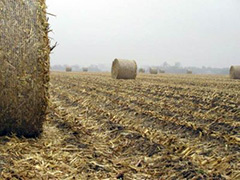Scientists at the University of Wisconsin-Madison have found a way to upgrade biofuels through the use of a plant-derived chemical. Because the process is both renewable and cheaper than current methods, it could make waves in the biofuel industry as research continues.
The process uses plant material based gamma valerolactone, or GVL. GVL is used to deconstruct plants and then create sugars. In fact, around 85 to 95 percent of the starting material can be converted to sugars through this process. Those sugars can be upgraded into biofuels, either chemically or biologically. Sugars are used to ferment yeast into ethanol. Alternately, the sugars can also be used to create drop-in biofuels through chemically upgraded furans (one of a group of colorless, volatile, heterocyclic organic compounds containing a ring of four carbon atoms and one oxygen atom).
According to the research, this process may reduce costs of ethanol production by 10 percent, compared to the costs of current methods.
Postdoctoral researcher and the research paper's lead author, Jeremy Luterbacher, thinks there are many possibilities that could come from this.
"Showing that removing and recycling GVL can be done easily, with a low-energy separation step, is a little more of an achievement. By feeding the resulting sugar solution to microorganisms, we proved we weren't producing some weird chemical byproducts that would kill the yeast, and that we were taking out enough GVL to make it nontoxic,” said Luterbacher.
Source:
http://www.sciencedaily.com/releases/2014/01/140116144639.htm





